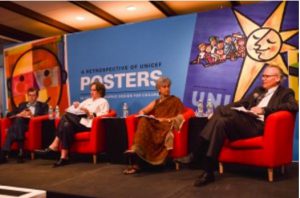… EDUCATION FOR PEACE …
An article from UNICEF
UNICEF and partners are a step closer to building peace, Eran Nagan, of the Government of the Netherlands said at a high-level event on education and peacebuilding in New York.
Mr. Nagan, First Secretary of Economic Affairs, Permanent Mission of the Kingdom of the Netherlands to the United Nations, joined some 80 UN staff, researchers, civil society, private sector representatives and members of the public to celebrate the final event of the Learning for Peace programme on Thursday, 30 June at UNICEF House. The UNICEF programme, launched in 2012 with the support of the Government of the Netherlands, helped promote peace through education in 14 conflict-affected countries: Burundi, Chad, Cote d’Ivoire, Democratic Republic of the Congo, Ethiopia, Liberia, Myanmar, Pakistan, Sierra Leone, Somalia, South Sudan, State of Palestine, Uganda, and Yemen.

Panelists (L-R) Patrick Fine, FHI 360 CEO; Angela Kearney UNICEF Pakistan Representative; Yasmin Haque, UNICEF Deputy Director of Emergency Programmes; Henk-Jan Brinkman UN Peacebuilding Support Office Chief of Policy Planning and Application.
Click on image to enlarge
“The teaching of tolerance, respect for the other, promoting social cohesion is a necessity of any society because it is by inserting these essential values in our youth that we forge peaceful societies for the future,” Mr. Nagan said in his key note address, praising the programme for its achievements over the last four and a half years. Learning for Peace worked with governments, education systems, and communities to design education interventions that addressed underlying causes and dynamics of conflict. The programme also included a significant research component to fill the gap in knowledge and evidence on social services for peacebuilding.
Research from UNICEF and FHI 360 found evidence that education inequities reinforce social divisions that lead to conflict – the likelihood of violent conflict doubles in countries with high education inequality between ethnic and religious groups. Conversely, conflict widens educational inequalities. Although less pronounced, the study also provides evidence that gender-based education inequality makes violent conflict more likely, and vice versa.
(Article continued in right column)
Peace education at the United Nations, how does it work?
(Article continued from left column)
“I think it has direct implications for how we set priorities and what kinds of actions we take in humanitarian response, and it also has immediate implications for policies and programmes,” Patrick Fine, FHI 360 CEO, said of the research findings.
Mr. Fine, along with Angela Kearney, UNICEF Pakistan Representative; Yasmin Haque, Deputy Director, Office of Emergency Programmes, UNICEF; and Henk-Jan Brinkman, Chief of Policy, Planning and Application, UN Peacebuilding Support Office were part of a panel to share experiences, achievements and lessons learned of the Learning For Peace programme.
Ms. Kearney shared stories of innovation in education from Pakistan, where findings from the programme’s conflict analysis informed education sector plans in the provinces of Sindh and Balochistan. In South Sudan, where 70 per cent of children have never stepped inside a school, Ms. Haque said that Learning for Peace helped develop a new, inclusive education system and forged new partnerships amongst education stakeholders and development partner organizations with peacebuilding expertise.
Josephine Bourne, Associate Director of Education at UNICEF, moderated the event and stressed that the lessons-learned on conflict-sensitive and peacebuilding-oriented education programming that began through the Learning for Peace programme would continue in future projects.
“While the programme is finishing, the work does not. There’s a very strong commitment to conflict assessment and really understanding the situation of children and their access to resources and other inequalities.” Ms. Bourne said. The inequality piece is front and center, not just for education, but everything UNICEF is doing”.
At the event, UNICEF also discussed plans to employ conflict assessment, study gender-based violence, and have children participate in determining the issues that drive conflict and necessary interventions. FHI 360 is also leading an education equity research initiative in conjunction with UNICEF and other partners including USAID, Save the Children and World Vision.
For more information on the programme please visit: learningforpeace.unicef.org.
(Thank you to the Global Campaign for Peace Education for bringing this article to our attention.)